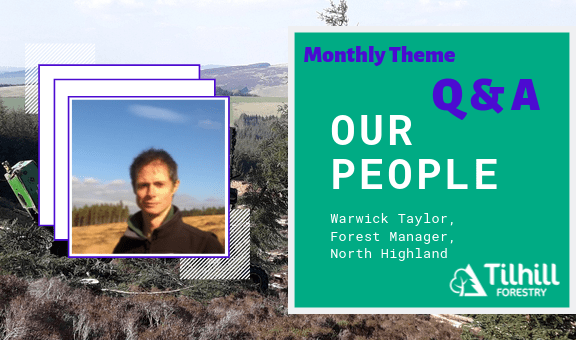This month’s theme is ‘Our People’ celebrating Tilhill Forestry’s staff and their fantastic work.
We asked Warwick Taylor, Forest Manager for North highland all about his job role and working for Tilhill Forestry.
Q. Can you give the audience some insight into what it is you do, what is your typical day?
A. There is no typical day. Every site is different and site visits vary enormously depending on what work is underway and what you need to inspect. If I am on site then it is usually to check on something specific or a number of things such as trees, weeds, weevils, roads etc. If work is underway then visits involve site supervision, checking on work quality, health and safety or instructing new work. Office days are spent writing forest plans, planning new work, drawing up budgets and corresponding or speaking to a wide range of people from clients to contractors.
Q. How did you get into forestry?
A. After leaving the RAF in search of a new career I came across forestry after speaking to staff at the Forestry Commission at a wood fair. I had always had a real interest in trees and forests so I knew immediately that this was the right path for me. I decided to do a MSc Forestry at Aberdeen University with a view to applying for a graduate position with a forestry company as the fastest route to becoming a forest manager.
Q. What do you like most about working in the forest industry?
A. There is huge variety in my work, both on site and in the office and this always makes the work interesting. Every job is a project and you work on it from the planning stages right through to the completion of operations and beyond with monitoring and this is very satisfying. I enjoy being on site in the fresh air but we have a great team in the district and the office work is fun too.
Q. Why did you decide to work for Tilhill Forestry?
A. I recall Tilhill Forestry being mentioned as one of the leading opportunities for graduates when I had my first chat at the wood fair so I had always planned to apply to the company. I was very impressed by the well-organised recruitment process: Tilhill Forestry was the first to interview and the first to offer a job. I accepted straight away and declined all other offers.
Q. What do you like most about Tilhill Forestry?
A. The high quality of my colleagues throughout the company.
Q. How do you feel Tilhill Forestry contributes to its employees’ professional development?
A. I have had lots of organised training in the last 5 years but most of what I know is from doing the job and learning from my colleagues. On-the-job training and mentoring is really the best way to build experience and the key to this is the willingness of colleagues and managers to trust and guide you.
Q. What sorts of changes are occurring in your occupation?
A. The sector is constantly changing; usually in small ways but this makes it necessary to keep reading industry periodicals and briefing notes and attending industry events. However, the most important changes are on site, whether seasonal, due to weather or as a result of work being conducted. It is amazing how different a site can look after a few weeks; often after a few days; and sometimes after only a few hours. I am surprised by this and it is important to be on site regularly, to be aware of what is going on around you and to try to think ahead.
Q. How does a person progress in your field?
A. There is a natural progression from graduate to Forest Manager and then Senior Forest Manager. This is down to a mixture of experience and time served (at least, that’s my impression) but becoming chartered is an important step.
Q. What is your advice to anyone wishing to pursue forestry as a career?
A. I would say it is very important to get some formal training at a forestry college or university if you are looking for a permanent position. For a more mature person who is looking to change career then a one-year MSc is an excellent way of doing so.



